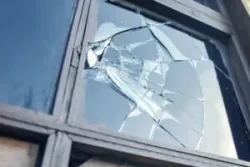
If a covered peril damaged your home’s windows, your homeowners’ insurance does cover window damage. If events not specifically mentioned in your policy caused window breakage, you may have to pay for repair or replacement out of your pocket. An insurance claims lawyer can help you identify the cause of your window damage and file a claim for coverage.
As a responsible homeowner, you purchased insurance protection for a reason. When you need to repair or replace your damaged property, you should be able to turn to your policy for coverage. If you meet resistance, a Corpus Christi insurance claims lawyer can negotiate with the insurance company and its adjuster for the compensation you need and deserve.
Seeking Compensation From Your Home Insurance Policy for Window Damage
Window replacements or repairs, especially when multiple windows are damaged, can get very expensive very quickly. When your claim is valid, your homeowners policy should cover these expenses.
If your window damage falls within your insurance coverage limits, you should receive compensation for:
- The same or similar replacement windows
- Window repair costs
- Window framing materials
- Installation and glazing
- Labor and material disposal
- Temporary window boarding
Your homeowners’ insurance may also pay the liability portion of your claim (when applicable) if you or a member of your household is liable for a neighbor’s broken window. Learn more about the coverage and limitations of your policy by reaching out to an insurance claims lawyer in your area.
Let an Insurance Claims Lawyer Review Your Texas Homeowners’ Policy
Insurance policies are full of legal and insurance language and jargon that can be hard for a layperson to understand. In addition, you may have multiple policies for your home—hail, flood, hail, earthquake, etc.—making it hard to know which one to use and when.
In general, standard homeowners insurance policies typically include the following six parts:
- Dwelling coverage
- Personal property coverage
- Other structures coverage
- Living expenses coverage
- Personal liability coverage
- Medical payments coverage
The dwelling and other structure’s portion of your coverage may provide compensation for your primary windows or for windows on a shed, garage, or other outbuilding. Your lawyer will review your policy, including any amendments and additional coverage.
We have offices in Houston, Corpus Christi, and Victoria; and will travel to any corner of Texas if we are capable of preventing an injustice.

An Insurance Claims Lawyer Can Appeal if the Claims Adjuster Denied Your Initial Claim
You do not have to accept a lowball offer or a denied claim without a fight. Texas’ Homeowner’s Bill of Rights further details what you can expect when filing a valid claim, including fair treatment and an explanation if the insurance carrier denies your claim.
When a lawyer handles your case, they can appeal on your behalf and help you keep fighting for fair compensation. They will:
- Collect supporting evidence
- Clarify why the insurance company rejected your claim
- File a complaint against the company
An insufficient claim can be as ineffective and stressful as a denied one. If the adjuster lowballed your claim, your lawyer can request an independent assessment of its value.
Missed Deadlines and Other Reasons Your Insurer May Deny Your Broken Window Insurance Claim
Your insurer may deny your claim for valid reasons. That is why understanding every detail of your policy is important. The best way to do so is to let an insurance claims lawyer examine your policy’s language and any correspondence about your denied claim.
Reasons for denying your claim can include:
- Uncovered cause of damage
- Insufficient supporting evidence
- You filed your claim too late
- Late payment or lapsed policy
- Ordinary wear and tear
- Lack of appropriate maintenance
Unfortunately, insurance companies might also engage in bad faith practices when denying otherwise valid property claims. A lawyer who is familiar with handling claims like yours and dealing with unscrupulous actions can help you avoid the consequences of these tactics.
How to Prove the Cause of Your Damaged or Destroyed Windows
Window glass, glazing, and frames are vulnerable to different types of damage. Some of the most commonly reported causes of cracked, broken, or destroyed windows include:
- Wind, storm, and other weather-related damage
- Theft, fire, and vandalism-related damage
- Accidental breakage from inside or outside
The insurance adjuster assigned to your case will investigate the cause of your damaged windows. To prove your right to compensation, they will request evidence, including:
- Before photos of your windows, if available
- Photos of the damaged windows and surrounding area
- Any official reports related to the damage
- Statements from anyone who witnessed the damage
- Fair and accurate window repair cost estimates
If an attorney represents you, they can help you collect evidence to document your claim’s validity. They can also complete and submit your homeowners insurance claim forms and handle all communication with the insurance provider on your behalf. Your lawyer can handle all verbal, written, and electronic means of contact.
Timelines and Other Important Factors in the Insurance Claims Process
If you are handling your insurance claim alone, you should pay careful attention to all relevant filing deadlines. Filing your claim too late could lead to its denial. The insurance company must subsequently handle your claim in a timely fashion. In general, Texas Department of Insurance (TDI) guidelines give the insurer:
- 15 business days to acknowledge receipt of your claim
- 15 business days to accept or reject your claim
- Five business days to make payment on an approved claim
If your insurer does not meet these deadlines when handling your claim, an insurance claims attorney can outline your options. They can also help you understand and comply with your notification and filing deadlines.
Representing the injured in all areas of Texas that extends back over 40 years

Get Your Free Insurance Claim Consultation Now
If an event covered in your insurance policy damaged or destroyed your home windows, an insurance claims lawyer can help you seek fair compensation. We will review your policy in detail to assess whether your homeowners’ insurance covers window damage.
You do not have to fight the insurance company alone. Contact our consultation team at Carrigan & Anderson, PLLC to get the help you need today.
At Carrigan & Anderson, PLLC we can talk to you about your options and rights.


